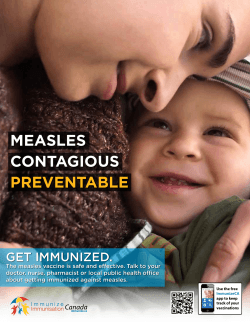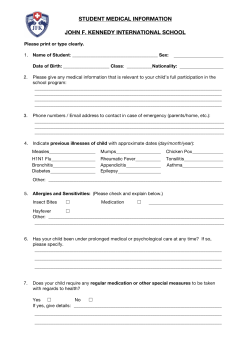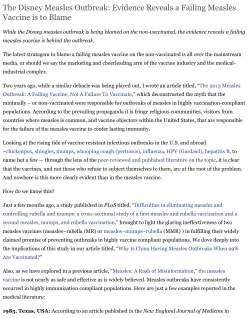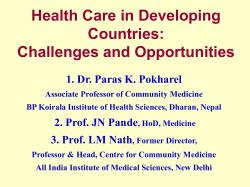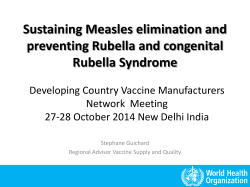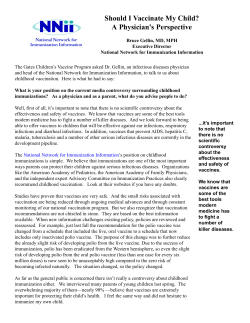
MCAAP Measles Update April 27, 2015
2015 U.S. Measles Update (as of 4-27-15) The following information has been developed to update Massachusetts providers about the ongoing U.S. measles outbreak, and to provide measles information and resources for providers, and their patients and families. Recent updates are noted in red. Table of Contents CDC - Measles Cases and Outbreaks (as of 3-20-15) Updated! U.S. multi-state measles outbreak, December 2014—April 2015 Measles Vaccination Recommendations Measles Vaccination Recommendations for Those Who Travel Internationally Guidance for Clinicians Guidance and Resources for Parents Massachusetts School Immunization Requirements for the 2014-2015 School Year Massachusetts Immunization Exemptions Vaccine Preventable Disease Exclusion Guidelines in School Settings Contact Information CDC – Measles Cases and Outbreaks (as of 4-27-15) 2015 measles cases From January 1 to April 24, 2015, 166 people from 19 states in the U.S. and the District of Columbia have been reported as having measles [AZ (7), CA (103), CO (1), DC (2), DE (1), FL (5), GA (1), IL (15), MI (1), MN (1), NE (2), NJ (1), NY (3), NV (9), OK (1), PA (1), SD (2), TX (1), UT (2), WA (7)]*. Most of the cases [117 (70%)] are considered to be part of a multi-state outbreak linked to an amusement park in California. o Most of these people were unvaccinated (about 5 out of 10) or did not know whether they were vaccinated (about 4 out of 10). A minority of them were vaccinated (about 1 out of 10). o Reasons for not receiving measles vaccine include philosophical or religious objections, ineligible, missed opportunities for vaccination, and other. o Cases have ranged from 6 weeks to 70 years. o Some of them have been hospitalized. o Of the 166 measles cases, 160 (96%) were import-associated. o Fourteen of these people brought measles into the U.S. after getting infected in other countries (Indonesia, Singapore/Indonesia, India, Dubai/India, Qatar, Azerbaijan, Pakistan, 2015 Measles Update (as of 4-27-15) Page 1 o Kyrgyzstan, Germany, and China respectively). Some of them spread measles to other people in the U.S. Measles genotypes identified to date include B3, D4, D8, D9, and H1. *Preliminary data reported to CDC’s National Center for Immunization and Respiratory Diseases, updated weekly on Mondays. See most up-to-date information on measles cases and outbreaks (updated every Monday) CDC posted a map showing the measles that are part of the large, ongoing, multi-state outbreak linked to an amusement park in California: http://www.cdc.gov/measles/multi-state-outbreak.html U.S. multi-state measles outbreak, December 2014—April 2015 The U.S. experienced a multi-state outbreak of measles linked to an amusement park in California. o From December 28, 2014 to April 24, 2015, 147* people from 7 states in the U.S. [AZ (7), CA (131), CO (1), NE (2), OR (1), UT (3), WA (2)] have been reported to CDC as having measles and are considered to be part of this outbreak. Additional cases linked to this outbreak have been reported in Mexico and Canada. o The source of the outbreak has not been identified. However, it likely started from one or more travelers who got measles overseas then visited the amusement park while infectious and spread it to others. o Analysis by CDC scientists shows that the measles virus type in this outbreak (B3) is identical to the virus type that caused the large measles outbreak in the Philippines in 2014. This virus type has also been identified within the past 6 months in 14 other countries. Additionally, at least six other states in the U.S. have had measles cases with B3 virus type, not associated with the current outbreak. *Outbreak includes 30 cases reported in 2014 Measles Vaccination Recommendations The best protection against measles is MMR vaccine. MMR vaccine provides long-lasting protection against all strains of measles. Make sure you’re up to date on MMR and other vaccinations. o Children should receive two doses of MMR vaccine–the first dose at 12 through 15 months of age and the second dose 4 through 6 years of age. Giving the second dose of the vaccine earlier is allowed at any time as long as it is at least 28 days after the first dose. o Unless they have evidence of measles immunity, college and other students, health care personnel, and international travelers need 2 appropriately spaced doses and other adults need 1 dose. Ask your health care provider if you have questions about whether you need MMR vaccine. o People who received two doses of MMR vaccine as children according to the U.S. vaccination schedule do not ever need a booster dose. The Recommended Immunization Schedules for Persons Aged 0 Through 18 Years – United States, 2015, and the Recommended Adult Immunization Schedule – United States, 2015, have been published and are available at the following link: http://www.cdc.gov/vaccines/schedules/hcp/index.html 2015 Measles Update (as of 4-27-15) Page 2 An easy-to-read immunization schedule for parents, 2015 Recommended Immunizations for Children from Birth Through 6 Years Old, can be found at the following link: http://www.cdc.gov/vaccines/parents/downloads/parent-ver-sch-0-6yrs.pdf Guidance for Clinicians Healthcare providers should be vigilant about measles— o Ensure all patients are up to date on measles-mumps-rubella (MMR) vaccine. o Consider measles in patients presenting with febrile rash illness and clinically compatible measles symptoms (cough, coryza, and conjunctivitis), and ask patients about recent travel internationally or to domestic venues frequented by international travelers, as well as a history of measles exposures in their communities. o Promptly isolate patients with suspected measles to avoid disease transmission and immediately report the suspect measles case to the local health department and MDPH at 617983-6800. Cases diagnosed in Boston should be reported to the Boston Public Health Commission at 617-534-5611. o Obtain specimens for testing from patients with suspected measles, including viral specimens (NP swab in viral transport media) for genotyping, which can help determine the source of the virus. o Contact the Massachusetts Department of Public Health with questions about submitting specimens for testing at 617-983-6800. During a measles outbreak health officials may recommend giving a dose of MMR vaccine in excess of, or earlier than, what is recommended in the U.S. vaccination schedule, as an outbreak-control measure: o If many cases are occurring among infants younger than 12 months of age with an ongoing risk for exposure (e.g., an outbreak in a childcare center), health officials may recommend giving measles vaccine to infants as young as 6 months of age. Note that children vaccinated before their first birthday should be revaccinated when they are 12 through 15 months old, and again when they are 4 through 6 years of age. o If many cases are occurring among preschool-aged children, health officials might recommend that a second dose of MMR vaccine be given to children ages 1 through 4 years. o If many cases are occurring among adults with community-wide transmission, health officials might recommend that adults who only have documentation of 1 dose of MMR vaccine be given a second. o State health departments have authority to provide revised vaccine recommendations during measles outbreaks. For more information, including guidelines for patient evaluation, diagnosis and management, visit: http://www.cdc.gov/measles/hcp/ The Immunization Action Coalition (IAC) also has helpful measles resources for providers posted on its website, www.immunize.org. Click on the links below for specific information: Ask the Experts: Measles, Mumps, and Rubella Diseases and Vaccines: Measles Measles Images 2015 Measles Update (as of 4-27-15) Page 3 Standing Orders for Administering Measles, Mumps & Rubella Vaccine to Children & Teens Standing Orders for Administering Measles, Mumps & Rubella Vaccine to Adults MMR Vaccine Information Statements (in English and 22 languages) Sample Vaccine Policy Statement Measles Vaccination Recommendations for those who travel internationally People traveling outside of the United States are at increased risk of exposure to measles and should have evidence of measles immunity. This disease is quite common in many countries throughout the world. The CDC recommends that travelers who are not immune to measles receive two doses of the MMR vaccine for their own protection and to prevent importation of the measles virus into the United States. Before any international travel, infants 6 months through 11 months of age should have at least one dose of MMR vaccine. Children 12 months of age or older should have two doses separated by at least 28 days. Adults should review their vaccination records to ensure they're up to date. The links below provide valuable information to help travelers protect themselves and others from measles. CDC Travelers’ Health CDC Travel Advisory on Measles The CDC “Health Information for International Travel” (commonly called the Yellow Book) serves as a reference for those who advise international travelers about health risks. Travelers’ Health has specific guidance for audiences that may be at higher risk for measles, such as humanitarian aid workers, long-term travelers, and VFR travelers. World Health Organization (WHO) fact sheet on measles Guidance and Resources For Parents Parents should make sure their children are protected against measles with two doses of MMR vaccine– the first dose at 12 through 15 months of age and the second dose 4 through 6 years of age. Visit CDC’s Measles Resources webpage and use matte article, posters, buttons, and other materials to assist as you educate your colleagues, parents, and the public about measles and MMR vaccine. Here are some CDC websites for parents: General article about measles: http://www.cdc.gov/features/measles/ Fact sheet about measles and MMR vaccine specifically for parents: http://www.cdc.gov/vaccines/vpd-vac/measles/fs-parents.html Frequently Asked Questions about measles and MMR vaccine: http://www.cdc.gov/measles/about/faqs.html The Immunization Action Coalition (IAC) also has helpful measles resources for parents and patients posted on its website, www.immunize.org. Click on the links below for specific information: 2015 Measles Update (as of 4-27-15) Page 4 Measles web page on vaccineinformation.org Measles: Questions and Answers Measles, Mumps, and Rubella Are Serious Diseases...Make Sure Your Child Is Protected [Spanish-language version] MMR Vaccine Does Not Cause Autism Personal Testimonies about Measles: 1) Roald Dahl: A Dangerous Illness, 2) Measles Not Worth the Risk, 3) Open Letter to Parents, 4) The Problem, and 5) Schoolboy, 13, Dies as Measles Makes a Comeback State Laws and Mandates Vaccine Hesitancy Resources Decision to Not Vaccinate My Child Evidence Shows Vaccines Unrelated to Autism Need Help Responding To Vaccine-hesitant Parents? Science-based Materials Are Available From These Respected Organizations Personal Belief Exemptions for Vaccination Put People at Risk Top Ten Reasons to Protect Your Child by Vaccinating [Spanish-language version] Vaccine Concerns: MMR Massachusetts School Immunization Requirements for School Year 2014-2015* The Massachusetts School Immunization Requirements for School 2014-2015 can be found at the following link: http://www.mass.gov/eohhs/docs/dph/cdc/immunization/guidelines-ma-schoolrequirements.pdf Massachusetts Immunization Exemptions Massachusetts Immunization Exemptions and Vaccine Preventable Disease Exclusion During Disease Outbreaks can be found at the following link: http://www.mass.gov/eohhs/docs/dph/cdc/immunization/guidelines-vaccine-exclusions-school.pdf Definition of Allowable Exemptions There are two situations in which children who are not appropriately immunized may be admitted to school: 1) A medical exemption is allowed if a physician submits documentation attesting that an immunization is medically contraindicated; and 2) A religious exemption is allowed if a parent or guardian submits a written statement that immunizations conflict with their sincere religious beliefs. Philosophical exemptions are not allowed by law in Massachusetts, even if signed by a physician. Only medical and religious exemptions are acceptable. These exemptions must be kept in the students’ files at school (105 CMR 220.000 and M.G.L. c.76, ss. 15, 15C and 15D). Exclusion During Disease Outbreaks 2015 Measles Update (as of 4-27-15) Page 5 In situations when one or more cases of a vaccine-preventable or any other communicable disease are present in a school, all susceptibles, including those with medical or religious exemptions, are subject to exclusion as described in the Reportable Diseases and Isolation and Quarantine Requirements (105 CMR 300.000). The reporting and control of diseases identified as posing a risk to the public health is prescribed by state regulation and law. The Isolation and Quarantine Requirements establish isolation andquarantine requirements for cases of certain diseases and their contacts in certain high-risk situations,including the school setting. The following table outlines several of the more common childhood vaccine-preventable diseases identified in the requirements that may occur in schools and the corresponding exclusion requirements. Exclusion Guidelines for Select Vaccine-Preventable Diseases in a School Setting Disease: Measles Case and Symptomatic Contacts Exclude student/staff through 4 days after onset of rash. (Count the day of rash onset as day zero.) Asymptomatic Contacts If one case: exclude susceptibles1 from work or classes from the 5th through the 21st day after their exposure. If multiple cases or continuous (two or more days) exposure: exclude susceptibles1 through the 21st day after rash onset in the last case. These restrictions remain even if the contact received immune globulin (IG). Definition of Susceptibles: 1 Measles - Susceptibles include all those born in or after 1957 without: 1) written documentation of 2 doses of measles-containing vaccine; or 2) laboratory evidence of immunity or laboratory confirmation of disease. In an outbreak setting, all those with 0 or 1 dose may avoid exclusion if they promptly receive a dose. Those born in the United States before 1957 are considered immune; however, this should not be considered evidence of immunity for health sciences students and health care workers.* *Health care workers and health sciences students should have 2 doses of MMR and varicella, laboratory evidence of immunity or laboratory confirmation of disease. Reference: http://www.mass.gov/eohhs/docs/dph/cdc/immunization/guidelines-vaccine-exclusionsschool.pdf Contact Information: Massachusetts Chapter of the American Academy of Pediatrics Immunization Initiative Sean Palfrey, MD, FAAP, Director Richard Moriarty, MD, FAAP, Co-Director Cynthia McReynolds, MBA, Program Manager Telephone: 781.895.9850 2015 Measles Update (as of 4-27-15) Page 6 Email: cmcreynolds@mms.org www.mcaap.org/immunization Massachusetts Department of Public Health Immunization Program Telephone: 617.983.6800 www.mass.gov/dph/imm Centers for Disease Control and Prevention (CDC) Telephone: 800-CDC-INFO (800-232-4636) Contact CDC-INFO 2015 Measles Update (as of 4-27-15) Page 7
© Copyright 2025
